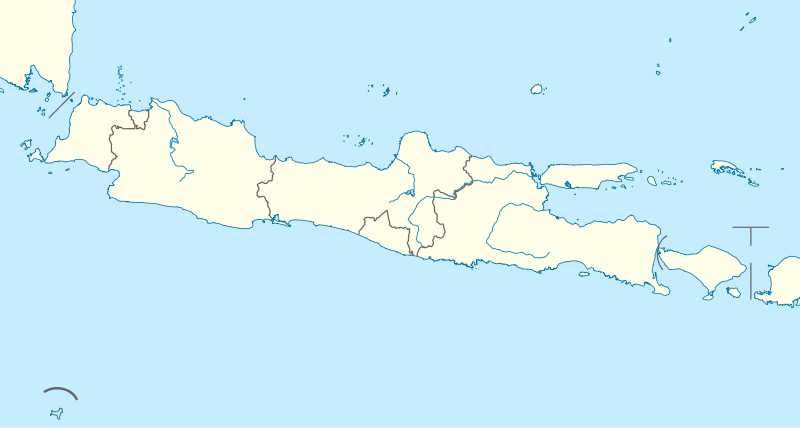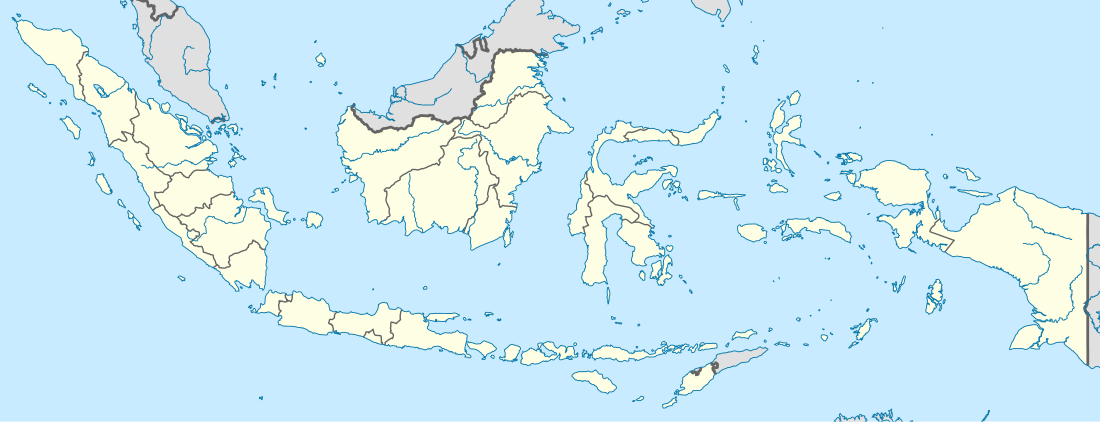Depok
Depok (Sundanese: ᮓᮦᮕᮧᮊ᮪) is a city in West Java province, and located within Jakarta metropolitan area in Indonesia. It has an area of 200.29 km2. As of 2014 census, it had a population of 1,869,681 people, with a density of 8,746 people/km2.[1] Depok was declared as a separate city on 20 April, 1999.
Depok | |
|---|---|
| City of Depok Kota Depok | |
| Other transcription(s) | |
| • Sundanese | ᮓᮦᮕᮧᮊ᮪ |
(From top, left to right): University of Indonesia, Ukhuwah Islamiyah Mosque, Crystal of Knowledge, Dian Al-Mahri Mosque and Margo City | |
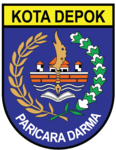 Coat of arms | |
| Nickname(s): | |
 Location within West Java | |
| Coordinates: 6°23′38″S 106°49′21″E | |
| Country | |
| Province | |
| Government | |
| • Mayor | Idris Abdul Shomad |
| • Vice Mayor | Pradi Supriatna |
| Area | |
| • Total | 200.29 km2 (77.33 sq mi) |
| Elevation | 50–140 m (164–459 ft) |
| Highest elevation | 140 m (459 ft) |
| Lowest elevation | 50 m (164 ft) |
| Population (2014) | |
| • Total | 1,869,681 |
| • Rank | 8th |
| • Density | 9,300/km2 (24,000/sq mi) |
| Time zone | UTC+7 (Indonesia Western Time) |
| Postcodes | 164xx, 165xx |
| Area code | (+62) 21/251 |
| Vehicle registration | B |
| Website | depok.go.id |
History
Depok word is an acronym of De Eerste Protestantse Organisatie van Christenen (Indonesian: Organisasi Kristen Protestan Pertama, English: First Protestant Christian Organization).[2][3] There is also a saying that the word "depok" itself comes from Sundanese meaning hermitage or abode of one living in seclusion.[4]
On 18 May 1696, a former VOC officer Cornelis Chastelein bought the land with an area of 12.44 km2, 6.2% the area of today's Depok. Besides cultivating the area with industrial plants with the help of the locals, Chastelein was active as a missionary, preaching Christianity to the indigenous Indonesians. To this end, he established a local congregation named De Eerste Protestante Organisatie van Christenen (DEPOC).[2][3] Although the Sundanese name Depok, meaning hermitage or abode of one living in seclusion, was already in existence before the establishment of the congregation, some insist the acronym might have been the origin of the city's name. Today majority of Depok's population are adherent to Islam, except for the majority of the original Depok family.
Before his death on June 28, 1714, Chastelein had written a will that freed the slave families of Depok and gave them pieces of his land, converting slaves into landlords. In 1714, the 12 slave families became landlords (forever as given to them with entitlement deeds of the owner Chastelien in his will) and freed men, women, and children. The freed slaves are also referred to as the Mardijker's – the word Merdeka meaning freedom in Bahasa Indonesia. June 28 is designated as Depokse Daag (Depok Day) by the original Depok family, and on June 28, 2014, 300 years of commemoration, they formally opened a 3-meter height monument on its own land, but it was prohibited by the Government as it referred to Dutch colonialization.[5]
The 12 original Depok family names are:[6]
- Bacas
- Isakh
- Jacob
- Jonathans
- Joseph
- Laurens
- Leander
- Loen
- Sadokh
- Samuel
- Soedira
- Tholense
The original slave families of Depok are of Balinese, Ambonese, Buginese, Sundanese and Portuguese Indo, i.e., Mestizo and Mardijker descent. Isakh, Jacob, Jonathans, Joseph, and Samuel were family names baptized by Chastelein after the slave families converted to Protestant Christianity. The other families retained their original names and might have been (Roman Catholic) Christian already before joining Chastelein's Protestant church. Descendants of the original Depok families with the exception of the Sadokh family, still live in Indonesia, the Netherlands, Norway, Canada and the United States.[7][6]
In 1871, the colonial government gave Depok a special status allowing the area to form its own government and president. The ruling no longer stood after 1952, where the Depok presidency ceded its control of Depok to the Indonesian government except for a few areas.
During the Bersiap (Indonesian civil war and war for independence from The Netherlands) period of 1945 much of Depok was destroyed and many of its inhabitants killed by 'Pemuda'.[8] Many of the original Depok families fled for their lives from Indonesia during the Indonesian revolution and now live in the Netherlands as part of the Indo community there.[9]
In March 1982, Depok was reclassified as an administrative city within Bogor Regency and, in 1999, as a city headed by a mayor. Then on 20 April 1999, the city of Depok was unified with some neighbouring districts of Bogor Regency to form an autonomous city of Depok (independent of the Regency) with an area of 200.29 km2.[10] This date is commemorated as a date of the establishment of the city.
Administration
Depok is headed by mayor, with legislative assembly. Both mayor and members of legislative assembly are elected by direct vote.
Mayors
- Moch. Rukasah Suradimadja (1982–1984)
- I. Tamdjid (1984–1988)
- Abdul Wachyan (1988–1991)
- Moch Masduki (1991–1992)
- Sofyan Safari Hamim (1992–1996)
- Badrul Kamal (1997–2005)
- Nur Mahmudi Ismail (2005–2015)
- Idris Abdul Somad (2015–present)
Districts

Depok is divided into eleven districts (kecamatan), tabulated below with their 2010 Census population.
| Name | Population Census 2010[11] |
|---|---|
| Sawangan | 123,571 |
| Bojongsari | 99,735 |
| Pancoran Mas | 210,514 |
| Cipayung | 127,917 |
| Sukmajaya | 232,308 |
| Cilodong | 125,014 |
| Cimanggis | 241,979 |
| Tapos | 216,215 |
| Beji | 165,903 |
| Limo | 87,953 |
| Cinere | 107,461 |
Culture
Shopping and dining
Depok has a growing eclectic collection of malls and traditional markets. Older malls or other notable shopping centers include Mall Depok, Depok Plaza, and SixtyOne Building, and Depok ITC. Depok has many local restaurants and has wide presence of international chains such as A&W Restaurant, Burger King, CFC, Kentucky Fried Chicken, McDonald's, Pizza Hut, Starbucks, Dunkin Donuts.
Modern-day landmarks that were once known as Depok's primary shopping centers include Ramanda (now an autoshop plus education centre), Hero Supermarket (now Index Home Furnishings) etc. There are many shopping centers in Depok, such as
- ITC Depok (anchor tenant: Carrefour)
- Depok Town Square — commonly referred to as DeTos (anchor tenant: Matahari) and Hypermart
- Margo City[12] (anchor tenants: Centro, Giant, Electronic City)

- Pesona Square (Anchor tenants:Centro, Hypermart, ACE)[13]
- D'mall (anchor tenant: Electronic Solution)
- Depok Town Center
- Plaza Depok
- Cinere Mall
- Cinere Bellevue Mall
- Cimanggis Square
- Trans Studio Mall Cibubur (anchor tenants: Metro and Transmart)
- Park Swangan shopping mall
Traditional markets include Pasar Depok Baru, Pasar Depok Lama (short: Pasar Lama), Pasar Kemiri (originally expanded to facilitate the move of Pasar Lama traders), Pasar PAL, Pasar Agung, Pasar Musi, Pasar Cisalak, and Pasar Majapahit.
Parks
Alun Alun Depok or Depok Square is equipped with various sports facilities such as a basketball court, futsal, skateboard, wall climbing, BMX arena, children's playground, fish pond, fountain, and others.[14]Godongijo Conservation and Education Park is located in Depok. The park provides children and teachers alike the ability to get up close and personal with nature. There are also other children's amusement parks in the city such as Depok Fantasi Waterpark, Taman Pemuda Pratama, Pondok Zidane etc.
Education
The following universities are in Depok:
- University of Indonesia
- Universitas Gunadarma
- Politeknik Tugu
- Jakarta State Polytechnic
- Sekolah Tinggi Teknologi Terpadu Nurul Fikri
- Muhammadiyah University of Depok
- Cluster Health Sciences University of Indonesia
- Faculty of Economics and Business University of Indonesia
- Bina Sarana Informatika
Depok has several private language schools, namely EF English First, International Language Programs (ILP), Lembaga Indonesia Amerika (LIA) and The British Institute (TBI),Lembaga Pendidikan Amerika Indonesia (LPIA) and several other smaller establishments. These are all along Margonda Raya and Cinere Raya, the two main roads that pass through Depok.
Sports
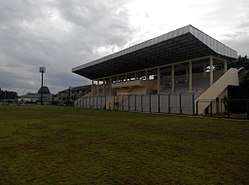
Depok is the home town of the Persikad Depok and Depok United FC football team who currently plays in the Liga 2.
Transportation
Toll Road Access

| KM | Toll Road | Destination |
|---|---|---|
| 13 | Jagorawi Toll Road | Cibubur, Cikeas, Cileungsi, Jonggol |
| 28 | Jakarta Outer Ring Road | Pasar Minggu, Lenteng Agung |
| 16 | Cinere-Jagorawi Toll Road | Cisalak, Juanda, Margonda |
| 13 | Depok–Antasari Toll Road | Sawangan, Parung, Ciputat, Serpong, Billabong, Bogor |
Public Transportation
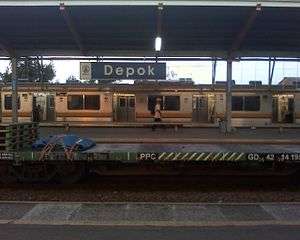
Angkot is the major means of public transportation in Depok. Go-Jek and Grab and taxicabs are easily available. Depok is connected to other areas of greater Jakarta by commuter train, TransJakarta & Kopaja buses. Depok Lama, Depok Baru Station, Universitas Indonesia Station, Pondok Cina Station and Citayam Station of KRL Jabodetabek commuter train service located within Depok. Commuter train is widely used to travel Jakarta city center and other parts of Greater Jakarta, but very crowded during peak hours.
Air
Depok is served by Soekarno-Hatta International Airport and Halim Perdanakusuma International Airport. Pondok Cabe Airport is located at Depok in borders South Tangerang, but doesn't have regular scheduled air service .
Twin towns – sister cities
Depok is twinned with:

See also
References
- Profil Daerah Jawa Barat Archived December 30, 2013, at the Wayback Machine
- Barley, Tasa Nugraza. "The Forgotten Bule Depok – Good News from Indonesia". Archived from the original on 2016-05-02. Retrieved 2016-10-18.
- "Depok: Perdebatan Sebuah Nama". 31 December 2008. Archived from the original on 5 March 2016.
- Sundanese English dictionary
- Hidayat, Rachmat (September 6, 2014). "Tugu Chastelein Dilarang Berdiri di Depok". Archived from the original on September 8, 2014.
- Jakarta Globe article. Archived 2010-08-29 at the Wayback Machine
- "Depok". www.depok.nl. Archived from the original on 2011-07-24.
- Meijer, Hans. ‘In Indie geworteld, de Geschiedenis van Indische Nederlanders, de twintigste eeuw.’ (Publisher Bert Bakker, Amsterdam, 2004) P.245 ISBN 90-351-2617-3
- (in Dutch) Dutch Depok community Website. Retrieved 20 May 2010. Archived 20 April 2008 at the Wayback Machine
- http://www.depok.go.id Archived 2006-10-11 at the Wayback Machine
- Biro Pusat Statistik, Jakarta, 2011
- Margocity. "Margocity". www.margocity.com. Archived from the original on 2007-01-08.
- "Menara Depok Asri Hadirkan Pesona Square, Mall Dengan Konsep Baru di Depok". Tribun News. Retrieved 22 May 2018.
- "Depok Square, The City's New Attraction". Tempo. Retrieved 13 January 2020.
- Post, The Jakarta. "Depok: The front line in Indonesia's fight against waste". Archived from the original on 2017-10-04.
External links
| Wikimedia Commons has media related to Depok. |
| Wikivoyage has a travel guide for Depok. |
- (in Indonesian) Official website
- Jakarta Globe News article by Tasa Nugraza Barley dd. August 26, 2010. Retrieved 15 October 2010
